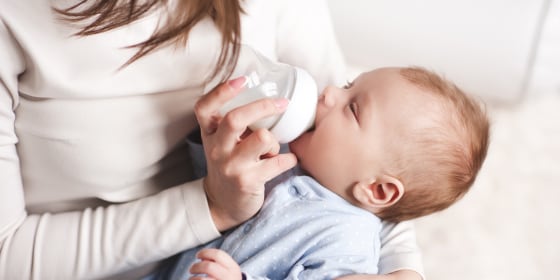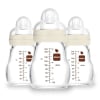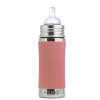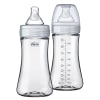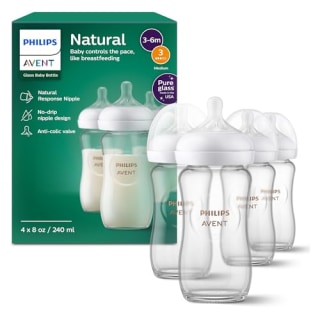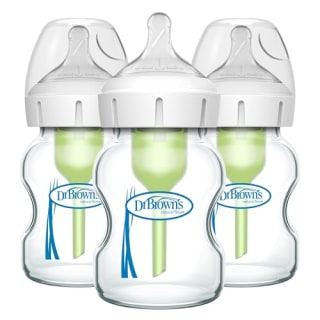When you have a baby, it feels like there are infinite things to think and worry about. Are they eating enough? Do you have the right diaper rash cream? Is their car seat installed correctly? And, more recently, there’s been buzz around plastic baby bottles and whether or not they are safe.
Unless you’ve been living under a rock, you’ve likely heard at least a bit of the buzz around microplastics. According to the U.S. Environmental Protection Agency, microplastics are tiny pieces of plastics in the environment that come from the breakdown of consumer products (say a plastic water bottle or food container) that you can then ingest. Over the last several years, there have been growing concerns around what microplastics do to the human body when consumed. Some research suggests ingesting large quantities of microplastics may trigger inflammation, disrupt hormone function and possibly even lead to cancer.
Given that babies tend to be more sensitive than adults, it’s not a surprise that some people are concerned with the implications of using plastic baby bottles and there has been a boom in glass bottles on the market. To learn more, we spoke with an environmental expert about how concerned you should be about plastic baby bottles and rounded up some highly rated plastic-free bottles to consider as alternatives.
“The concern with drinking from plastic bottles is that the plastics can shed microplastics and other plastic-related chemicals, particularly when they get heated, such as when preparing infant formula with warm water,” says Dr. Tracey Woodruff, a professor specializing in reproductive sciences at the University of California, San Francisco. There’s research to back this up. A 2020 study found that when formula was made according to preparation guidelines, anywhere from 1.3 million to 16.2 million particles of microplastics per liter were released.
So, why might consuming microplastics be dangerous? “Research is revealing more and more health impacts from microplastics almost daily,” says Woodruff. “Our team conducted the first systematic review of the research and found microplastics linked to respiratory, reproductive health, and digestive tract harms — and potential links to lung and colon cancer.” Woodruff notes that these studies were all conducted in healthy adult animals, but says that because infants are growing and developing and their bodies are more susceptible to health harms than adults.
If you want to avoid plastic baby bottles, there are a few options to consider when it comes to materials. “We recommend that you don’t put heated food or drink in plastic because that can increase shedding,” says Woodruff. “I would personally choose glass [baby bottles].”
Beyond glass, there are a handful of other options. I recently discovered stainless steel baby bottles and have used them from time to time with my 6-month-old son. There are also a number of hybrid options on the market — bottles that are glass inside but coated with plastic or silicone on the outside for easier handling.
Finally, you could consider silicone bottles as an alternative. While silicone can still shed microplastics, research has shown they release less microplastics than traditional plastic.
Below, we rounded up plastic-free baby bottles worth considering. We focused mostly on glass and stainless steel options that come recommended by NBC Select staffers or that have at least a 4-star average rating from thousands of reviews.
The only bottles my son will take come from this brand. The silicone nipples are a slightly flatter shape, which mimics the feel of nursing, making them particularly good for moms who combo feed. The actual bottles are made from temperature-resistant glass. These bottles can be sterilized at high temperatures and are dishwasher-safe, according to the brand. These are the 6-ounce version, but they are also available in a 9-ounce size.
I’ve also used these with my son. The stainless steel holds the temperature nicely and they’re covered in a silicone material that makes it easier to grip. The bottle comes with a medium flow nipple, making it a better choice for older infants. It also comes with a silicone lid that’s easy to take on and off. My only complaint about this bottle is that you can’t see through it, making it hard to measure as you pour.
This set comes with four 8-ounce glass bottles. They have what the brand calls a natural response nipple that lets the baby control the pace of the milk flow. The nipples also have vents to prevent your baby from sucking up too much air and getting gassy. The glass is heat-resistant and can be safely stored in the fridge or warmed up, according to Philips. These bottles have a 4.6-star average rating from over 7,500 reviews on Amazon.
In my experience, Dr. Brown’s bottles are popular with a lot of moms — I’ve seen them whipped out time and again during playdates and other kid-centric gatherings. This glass version comes with the same anti-colic vent system the brand is known for. The bottles have a wide mouth, making it easy to pour or scoop formula into them and all the parts are dishwasher-safe and can withstand high temperatures needed for sterilizing. These bottles hold up to five ounces of liquid and have a 4.6-star average rating from over 11,975 reviews on Amazon.
This set comes with two hybrid bottles that feel like a normal plastic bottle on the outside, but have a thin coating of shatter-resistant glass on the inside. The milk or formula only touches the glass, preventing microplastics from infusing into it. The bottles are lightweight, can be used in bottle warmers and are dishwasher-safe, according to the brand. They hold up to 9 ounces of liquid and have a 4.5-star average rating from over 3,630 reviews on Amazon.
At NBC Select, we work with experts with specialized knowledge and authority based on relevant training and/or experience. We also ensure all expert advice and recommendations are made independently and without undisclosed financial conflicts of interest.
- Dr. Tracey Woodruff is a professor specializing in reproductive sciences at the University of California, San Francisco.
Bethany Heitman is a contributor at NBC Select and a journalist who regularly covers topics like beauty, home and lifestyle. For this story, she interviewed an expert in reproductive science and utilized her personal experience as a mom to an infant and a toddler.
Catch up on NBC Select’s in-depth coverage of tech and tools, wellness and more, and follow us on Facebook, Instagram, Twitter and TikTok to stay up to date.
